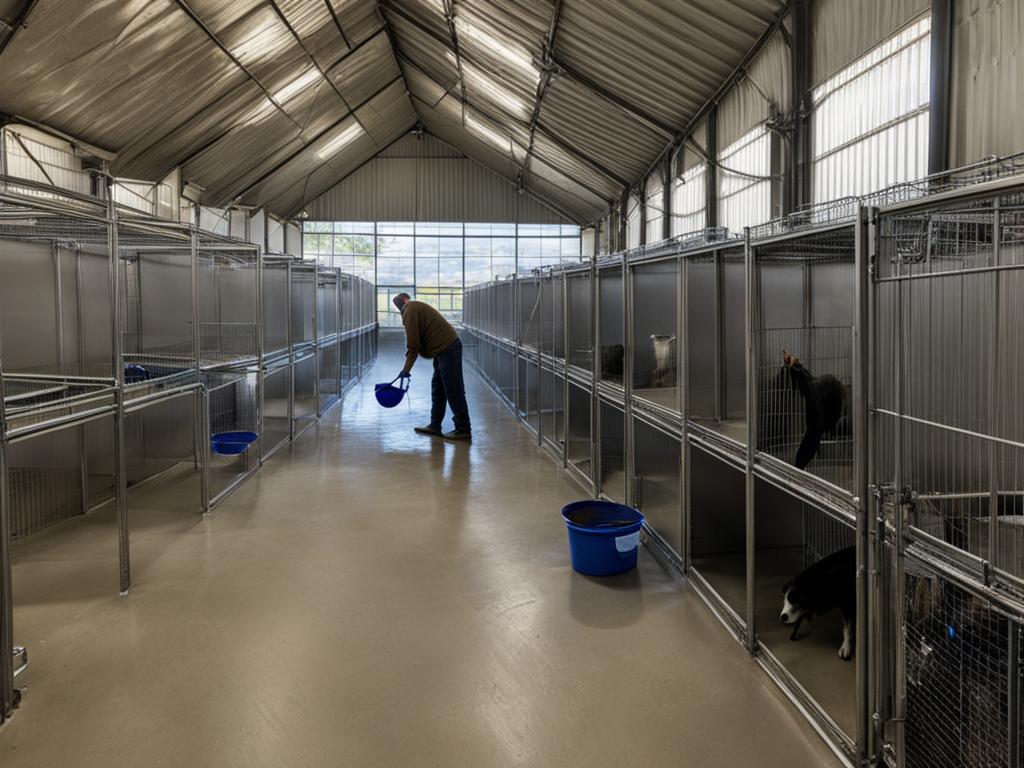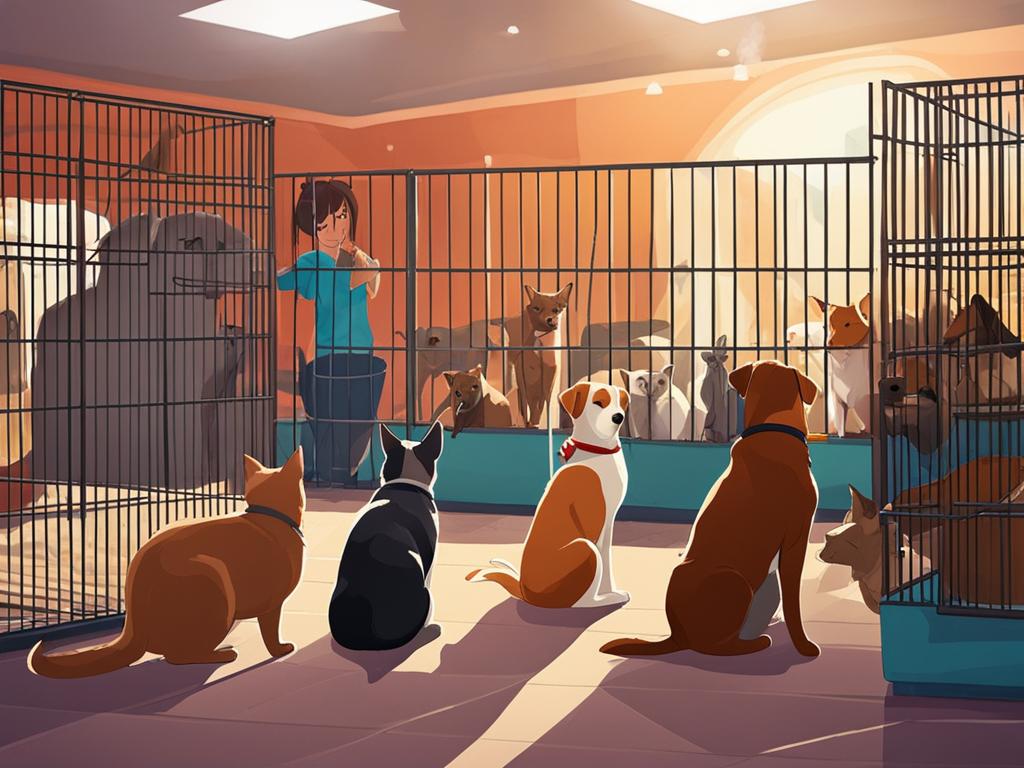Welcome to the world of pet adoption, where opening your heart and home to a furry friend can truly make a life-saving difference. By choosing to adopt from animal shelters or rescue organizations, you not only find a lifelong companion but also give a deserving animal a second chance at happiness. The bond that forms between humans and their adopted pets is a special one, built on compassion, love, and the shared joy of finding a forever home together.
When you adopt a pet, you become a hero in their eyes. You provide them with a safe and loving environment, free from the uncertainties of life on the streets or in overcrowded shelters. Whether you choose to adopt a cuddly cat or a playful dog, you’ll discover that shelters have a wide variety of adoptable pets waiting to find their perfect match. From playful puppies to wise and loving senior cats, there’s a pet for every person and lifestyle.
Choosing adoption not only brings immeasurable joy and fulfillment to your life but also plays a crucial role in combating the heartbreaking issue of animal homelessness. Millions of pets across the country and beyond are awaiting their chance to find a forever home, and by adopting, you contribute to the life-saving efforts of shelters and rescue organizations.
Join us as we explore the world of pet adoption, dispel myths, and shed light on the incredible benefits of adopting a pet. Discover the compassion, love, and fulfillment that come from saving a life and creating an unbreakable bond with a furry friend.
Key Takeaways:
- Adopting a pet from an animal shelter or rescue organization saves lives and provides a forever home to a deserving animal.
- Shelters have a variety of adoptable pets, including cats and dogs of different ages and breeds.
- Pet adoption plays a crucial role in combating animal homelessness and reducing the number of pets euthanized in overcrowded shelters.
- Choosing to adopt a pet brings immeasurable joy, fulfillment, and a special bond between you and your furry friend.
- By adopting, you become part of a compassionate community making a difference in the lives of shelter animals.
The Stark Reality: Millions of Pets Await Homes
Pet adoption is not just about finding a new furry friend; it is a critical step in addressing the ongoing issue of animal homelessness. Across the country, millions of pets are waiting in shelters, hoping to find a loving forever home. These shelter animals are the true heroes of the pet world, possessing immense potential and untapped qualities that often go overlooked.
The Overlooked Potential of Shelter Animals
Shelter animals are often portrayed as discarded or unwanted, but this couldn’t be further from the truth. They possess the same qualities and abilities as pets from other sources. Whether you’re looking for a loyal companion, a playful pet for your children, or a cuddle buddy, shelter animals have it all. They come in a variety of breeds and ages, ensuring that there’s a perfect match for every potential adopter.
The Alarming Statistics: Adoption vs. Euthanasia
While pet adoption can save lives, the harsh reality is that animal overpopulation continues to be a pressing problem. Overcrowded shelters often resort to euthanasia as a means to control the population and make space for new arrivals. This heartbreaking situation highlights the urgent need for more adoptions and responsible pet ownership.
Consider these alarming statistics:
- Each year, approximately 6.5 million companion animals enter animal shelters in the United States.
- Out of these, only 3.2 million are adopted, leaving millions of shelter animals without a home.
- Tragically, around 1.5 million shelter animals are euthanized each year due to overcrowding and lack of resources.
These numbers illustrate the scale of the pet overpopulation problem and the crucial role that adoption plays in saving lives. By choosing to adopt, you can make a significant difference in the lives of shelter animals.
Dispelling Myths: The Truth About Shelter Pets
Misconceptions Leading to Shelter Overpopulation
When it comes to shelter pets, there are many misconceptions that contribute to the ongoing issue of shelter overpopulation. These misconceptions often prevent potential adopters from considering shelter pets as viable options for bringing a furry friend into their homes. By addressing these misconceptions, we can help dispel myths and encourage more adoptions, ultimately reducing the number of pets awaiting homes in shelters.
One common misconception is that shelter pets are somehow inferior to pets from other sources. However, this is far from the truth. Shelter pets are just as capable of providing love, companionship, and loyalty as pets obtained through other means. Many shelter pets have been surrendered due to unfortunate circumstances such as owner relocation, financial hardship, or changes in the family dynamic. They deserve a chance at a loving home, and their past does not determine their potential for being wonderful companions.
Another misconception is related to health concerns and behavior issues. Some potential adopters worry that shelter pets may have various health problems or exhibit behavioral issues. While it’s true that some shelter pets may require additional care or training, it’s important to understand that most reputable shelters and rescue organizations provide necessary veterinary care, vaccinations, and behavioral assessments before making animals available for adoption. This ensures that adopters have a clear understanding of a pet’s health and behavior prior to making a commitment.
Health and Behavior: Debunking Common Concerns
Reputable shelters prioritize the well-being of their animals, focusing on rehabilitation and providing necessary medical care. Shelter pets often go through a process of healing and recovery, both physically and emotionally, before finding their forever homes. Through proper care and rehabilitation, many shelter pets overcome their past challenges and develop into well-adjusted and loving companions.
It’s important to debunk the misconception that shelter pets are more prone to health issues than pets obtained through other sources. In reality, shelter pets receive thorough veterinary evaluations, including vaccinations and spaying/neutering, which can actually contribute to better overall health outcomes. Additionally, shelters often provide information about a pet’s medical history and any known health conditions, enabling potential adopters to make informed decisions.
Behavior concerns can also be addressed through education and training resources provided by shelters. Many organizations offer post-adoption support and guidance to ensure a successful transition for both the pet and the adopter. With patience, understanding, and consistent training, shelter pets can easily become well-behaved and happy family members.

By dispelling these misconceptions and shedding light on the truth about shelter pets, we can help combat shelter overpopulation and encourage more people to consider adopting. Shelter pets have incredible potential to bring joy, love, and companionship into our lives. Let’s give them the chance they deserve and create a brighter future for all animals in need.
Pet Adoption and Saving Lives: A Compassionate Choice
Choosing to adopt a pet is not simply a decision to bring a new furry friend into your life. It is a compassionate choice that has the power to save lives and make a profound impact on the issue of pet overpopulation and animal homelessness.
Every pet adoption represents a life rescued from a potentially uncertain or tragic fate. By opening your heart and home to a shelter animal, you are providing them with a second chance at a happy and fulfilling life. The act of adoption directly contributes to saving lives, one pet at a time.
Pet overpopulation is a pressing issue that shelters and rescue organizations grapple with every day. By adopting a pet, you are helping to address this problem by reducing the number of homeless animals and easing the strain on already overcrowded shelters. Your decision to adopt not only changes the life of the animal you bring home but also creates space and resources for other pets in need.
The Joy of Adopting: Creating Lifelong Bonds
Adopting a pet brings immeasurable joy and the opportunity to form lasting bonds. The love and companionship that shelter pets offer are truly unconditional, as they are grateful for being given a second chance at life. The joy of adopting a pet goes beyond the initial excitement; it creates a lifelong connection with a loyal and loving companion.
Unconditional Love: The Emotional Rewards of Adoption
One of the most rewarding aspects of adopting a pet is experiencing their unconditional love. Shelter pets have often endured hardships and are eager to shower their new owners with affection and appreciation. Their unwavering loyalty and ability to see past past traumas serves as a reminder of the resilience of animals and the power of compassion.
When you open your heart and home to a shelter pet, you become their source of security and comfort. The bond that forms between an adopted pet and their owner is built on trust, understanding, and a shared journey of healing. It’s through this bond that both the pet and their owner find solace, joy, and a sense of belonging.
From Shelter to Forever Home: Heartwarming Stories
The joy of adopting is best captured through the heartwarming stories of shelter pets finding their forever homes. These shelter success stories showcase the transformative power of adoption, where once neglected or abandoned animals blossom into happy and thriving companions.
“I adopted Luna from a local shelter, and it’s been the best decision of my life. She came to me with a shy demeanor, but with time and patience, Luna’s personality began to shine. Now, she fills my home with laughter and love every day.”
“After adopting Max from the shelter, our family dynamics completely changed. He not only became our loyal furry friend but also brought us closer together as a family. Max’s playful nature and infectious happiness have enriched our lives in ways we never imagined.”
These heartwarming stories serve as a testament to the incredible transformation that occurs when an animal finds a loving and caring home. The joy and fulfillment that come from witnessing the positive impact of adoption cannot be understated.

The Contribution to Local Communities and Beyond
Supporting Community Shelters: A Ripple Effect of Kindness
When you choose to adopt a pet, you not only bring joy and love into your own life but also make a significant impact on your local community and beyond. Supporting community shelters through pet adoption creates a ripple effect of kindness that extends far beyond the individual animals and families involved.
By adopting a pet from a shelter, you are directly contributing to the well-being of your community. When shelters find loving homes for their animals, they free up space, resources, and manpower to take in and care for more pets in need. This domino effect allows shelters to rescue and rehabilitate even more animals, ultimately reducing the number of homeless pets.
The Environmental Impact of Pet Adoption
Not only does pet adoption have a positive community impact, but it also has important environmental benefits. When you adopt a pet, you are reducing the demand for pet breeding. This means fewer resources are required for the commercial breeding industry, including land, water, and energy. Additionally, the waste and pollution associated with breeding facilities are minimized.
Adopting a pet also helps reduce the number of animals that end up in overcrowded shelters or on the streets. By providing a loving home to an adoptable animal, you are helping prevent future strays and protecting wildlife habitats by reducing the chances of pets becoming feral or abandoned.
Understanding Shelter Operations: Cleanliness and Care
When it comes to animal shelters, cleanliness and proper care are of utmost importance. Shelter staff and volunteers go above and beyond to ensure a safe, clean, and nurturing environment for the animals in their care. These dedicated individuals work tirelessly to maintain high standards of animal care, including regular veterinary check-ups, vaccinations, and necessary treatments.
Animal shelter operations revolve around creating a space that promotes the well-being and health of the animals. Cleanliness is prioritized to prevent the spread of diseases and maintain a hygienic living space. Shelters have measures in place to ensure the thorough cleaning of kennels, cages, and common areas, minimizing any potential risks to the animals’ health.
Furthermore, shelter staff and volunteers provide essential care to the animals, including feeding, grooming, and socialization. They understand the unique needs of each animal and strive to meet those needs to the best of their abilities, providing comfort and companionship while the animals await their forever homes.

Shelter Pets vs. Breeder Purchases: An Ethical Dilemma
When it comes to welcoming a new pet into your home, you may find yourself facing an ethical dilemma: Should you adopt a shelter pet or purchase from a breeder? While both options have their merits, it is essential to consider the ethical considerations associated with each choice.
The Dark Reality of Puppy Mills
One of the most significant concerns when purchasing a pet from a breeder is the dark reality of puppy mills. These facilities prioritize profit over the well-being of animals, subjecting them to inhumane breeding practices and deplorable living conditions. Animals in puppy mills often suffer from neglect, abuse, and inadequate healthcare.
Why Adoption is the Ethical Alternative to Buying Pets
On the other hand, pet adoption provides an ethical alternative to supporting puppy mills and the pet store industry. When you adopt a shelter pet, you give them a second chance at life, helping to reduce the demand for commercially bred animals. By choosing adoption, you directly contribute to the welfare of animals and play a crucial role in the fight against animal cruelty.

Adopting a shelter pet not only saves a life but also offers a loving home to an animal in need. It is a compassionate and responsible choice that aligns with the values of kindness and empathy.
| Shelter Pets | Breeder Purchases |
|---|---|
| Helps reduce animal homelessness | Supports inhumane breeding practices |
| Provides a second chance for animals in need | Contributes to pet overpopulation |
| Supports ethical and responsible pet ownership | Contributes to the pet store industry |
By understanding the dark reality of puppy mills and the ethical benefits of adopting a shelter pet, you can make an informed decision that not only benefits you but also contributes to a more compassionate world for animals.
The Health Benefits of Pet Companionship
Emotional Support: Pets as Pillars of Mental Well-being
Having a pet as a companion can provide valuable emotional support and contribute to overall mental well-being. Pets have a unique ability to offer unconditional love, companionship, and a sense of purpose, which can greatly benefit individuals experiencing stress, anxiety, or loneliness.
Studies have shown that pet owners often experience lower levels of stress and improved mood compared to those without pets. The presence of a pet can help reduce feelings of anxiety and provide a comforting presence during difficult times. Their nonjudgmental nature and ability to offer unwavering support can make a significant difference in one’s mental and emotional state.
Physical Activity: The Added Bonus of Pet Ownership
Along with the emotional benefits, pet ownership also encourages physical activity and promotes a healthier lifestyle. Dogs, in particular, require regular exercise, such as daily walks or playtime, which can increase an owner’s level of physical activity and help improve fitness.
Engaging in physical activities with pets has been linked to various health benefits, including weight management and reduced risk of cardiovascular disease. Regular exercise not only benefits the pet’s well-being but also provides an opportunity for owners to stay active and maintain a healthy lifestyle.
Save Money While Saving a Life: The Economics of Adoption
When considering adding a furry companion to your family, pet adoption not only saves a life but can also save you money in the long run. Compared to purchasing a pet from a pet store or breeder, adopting from a shelter or rescue organization offers several cost benefits.
Cost Benefits: Avoiding the Pricy Pitfalls of Pet Stores
Buying a pet from a pet store or breeder often comes with a hefty price tag. In addition to the initial purchase cost, you may also be responsible for additional fees such as vaccinations, spaying/neutering, and microchipping. On the other hand, adoption fees from shelters are typically much lower and often cover these essential services.
Furthermore, pet store and breeder fees often do not include the cost of initial vet visits and medical care. These additional expenses can quickly add up, putting a strain on your budget. By adopting a shelter pet, you can avoid these pricy pitfalls and save a significant amount of money.
Healthcare Savings with Shelter Pets: Initial Medical Care
Many shelter animals are already vaccinated, spayed/neutered, and microchipped before they are made available for adoption. These procedures are essential for their health and well-being and can be costly if done independently. By adopting a shelter pet, you can save on these initial medical expenses.
Additionally, shelters often provide basic medical care, such as a health check-up and necessary treatments, to ensure that the animals are in good health before adoption. This further reduces the immediate healthcare costs associated with bringing home a new pet.
Furthermore, over the long term, shelter pets may bring additional healthcare savings. Many shelter animals have undergone thorough health screenings and evaluations, making them less prone to inherited genetic conditions. By choosing adoption, you can potentially avoid costly medical treatments and procedures that can arise from these genetic conditions.
By opting for pet adoption, not only are you providing a loving home to a deserving animal in need, but you’re also making a financially savvy choice. The cost benefits and potential healthcare savings make adopting a shelter pet a win-win situation for both your heart and your wallet.
A New Family Member: The Adoption Process
Bringing a new pet into your home is an exciting and fulfilling experience. The adoption process is an important journey that ensures you find the perfect match for your family. In this section, we will guide you through the steps and requirements involved in adopting a pet from a shelter.
What to Expect When You’re Adopting
When you decide to adopt a pet, it’s essential to understand the process and be prepared for what’s to come. Here are some things you can expect during the adoption process:
- Initial paperwork: You will need to fill out an adoption application, providing information about your living situation, lifestyle, and experience with pets.
- Home visits: Some shelters may require a home visit to ensure that your living environment is suitable for the specific pet you wish to adopt.
- Adoption fees: Most shelters charge adoption fees to cover the cost of care, vaccinations, and spay/neuter procedures for the pet.
- Waiting period: Depending on the shelter and the pet’s availability, there may be a waiting period before you can bring your new furry friend home.
It’s important to note that the adoption process may vary slightly from one shelter to another. Be sure to ask the shelter staff about their specific procedures and requirements.
Finding the Right Match: The Journey to Adoption
Finding the right pet to bring home requires careful consideration and a bit of soul-searching. Here are some tips to help you find the perfect match:
- Consider your lifestyle: Think about your daily routine, activity level, and living arrangements. Some pets may require more exercise or have specific needs that align better with your lifestyle.
- Research different breeds and species: Learn about the characteristics, temperament, and care requirements of different breeds or species. This will help you determine which type of pet is the best fit for you.
- Visit the shelter: Spend time at your local shelter and interact with the animals. Observing their behavior, energy level, and personality can give you insights into their compatibility with your family.
- Ask questions: Don’t hesitate to ask the shelter staff any questions you may have about a specific pet. They can provide valuable information about the pet’s history, medical needs, and temperament.
Bringing a new pet home is a momentous occasion that marks the beginning of a lifelong bond. By following the adoption process and taking the time to find the right match, you’re setting the stage for a joyful and fulfilling relationship with your new family member.
The Ripple Effect: Inspiring Others Through Your Adoption Story
Sharing your personal adoption story has the power to inspire others and make a positive impact in advocating for shelter pets. By sharing your experience, you can encourage more people to consider pet adoption and help raise awareness about the importance of providing loving homes to animals in need.
Storytelling is a powerful tool that connects people on an emotional level. When you share your journey of adopting a pet, you create a relatable and authentic narrative that resonates with others. Your story can touch the hearts of potential adopters who may be on the fence about adoption, inspiring them to take that leap of faith and open their homes to a shelter pet.
One of the most effective ways to share your adoption story is through social media. Post pictures and details about your adopted pet, highlighting the transformation and joy they have brought into your life. Use hashtags related to pet adoption and advocacy to reach a wider audience. Your story can inspire and motivate others to consider adopting a pet instead of buying one.
You can also share your adoption story through word-of-mouth. Talk to friends, family, and colleagues about your experience and the positive impact adoption has had on your life. Personal recommendations and stories often carry more weight than generic messages, making them highly influential in changing perceptions and encouraging others to follow suit.
Getting involved in local advocacy efforts is another way to share your adoption story and inspire others. Volunteer at your local shelter and offer to share your story during adoption events or on their website. By actively participating in advocacy programs, you can help raise awareness about the benefits of pet adoption and the incredible difference individuals can make in the lives of shelter pets.
Your adoption story has the potential to create a ripple effect, inspiring others to consider adopting a pet and advocating for shelter animals. By sharing your experience, you contribute to the growing movement of compassion and awareness, helping to save more lives and give animals a second chance at a happy, loving home.
Conclusion
Your Role in the Fight Against Animal Homelessness
Throughout this article, we have highlighted the importance of pet adoption in saving lives and addressing the issue of animal homelessness. By opening your heart and home to a shelter pet, you have the power to make a lasting impact on both individual animals and the larger problem at hand.
The Lasting Impact of Choosing to Adopt
When you choose to adopt a pet, you provide them with a second chance at life and give them the love and care they deserve. But the impact goes beyond the individual pet you bring home. Your adoption also helps alleviate the burden on animal shelters and reduces the number of homeless animals in our communities.
By adopting a pet, you are actively contributing to the fight against animal homelessness. Your compassionate choice inspires others to consider adoption and raises awareness about the countless pets waiting for their forever homes. Together, we can make a difference.
Take action today and get involved! Support your local shelters and rescue organizations through donations, volunteering, or spreading awareness. Share your adoption story to inspire others and encourage them to make the choice to adopt. Together, we can create a world where every pet has a loving home.
FAQ
How does pet adoption save lives?
Pet adoption saves lives by providing a second chance to animals in need. When you adopt a pet from a shelter or rescue organization, you are giving them a loving and safe forever home, ultimately saving them from potentially uncertain or tragic fates.
How many pets are waiting for homes in shelters?
There are millions of pets awaiting homes in shelters across the country. The current state of animal homelessness is a pressing issue, and these animals need our help to find their forever homes and escape the cycle of shelter life.
Are shelter animals just as good as pets from other sources?
Yes, shelter animals have the same potential as pets from other sources. They often possess the same qualities, abilities, and capacity for love and companionship. By adopting a shelter pet, you are giving them the opportunity to thrive and become a cherished member of your family.
What is the difference between adopting a pet and buying from a breeder?
Adopting a pet from a shelter is a compassionate choice that supports the well-being of animals in need. Buying from a breeder may contribute to the unethical practices of puppy mills, which prioritize profit over animal welfare. Adoption is an ethical alternative that helps combat the issue of overpopulation and reduces the demand for commercially bred pets.
What are the health benefits of pet adoption?
Pet adoption has numerous health benefits. Pets provide emotional support, reducing stress, anxiety, and loneliness. They also promote physical activity and exercise, leading to improved fitness and overall health. Additionally, studies have shown that pet owners tend to have lower blood pressure and cholesterol levels, leading to a healthier lifestyle.
Is pet adoption expensive?
Pet adoption is often more affordable than purchasing a pet from a pet store or breeder. Many shelter animals are already vaccinated and spayed/neutered, which saves costs on initial medical care. Choosing adoption can also lead to lower long-term healthcare expenses, making pet ownership more accessible and affordable.
What should I expect during the pet adoption process?
The pet adoption process usually involves paperwork, potential home visits, and an adoption fee. It’s essential to find the right match between you and the pet, considering factors such as lifestyle, activity level, and compatibility. Shelter staff or volunteers will guide you through the process and help you find the best pet for your home.
How can I inspire others to consider pet adoption?
Sharing your personal adoption story and experiences can inspire others to consider pet adoption. By sharing on social media, through word-of-mouth, or by getting involved in local advocacy efforts, you can raise awareness about the importance of pet adoption and promote the cause of shelter pets.
What can I do to support my local shelters and rescue organizations?
There are many ways to support your local shelters and rescue organizations. You can volunteer your time, make donations, participate in fundraisers, or even become a foster pet parent. The ripple effect of kindness occurs when individuals come together to support their community shelters and make a difference in the lives of shelter animals.
What is my role in the fight against animal homelessness?
Your role in the fight against animal homelessness starts with considering pet adoption. By choosing to adopt, you are directly contributing to saving lives and reducing the number of homeless animals. Additionally, spreading awareness, supporting local shelters, and encouraging others to adopt can make a lasting impact on the lives of animals in need.
Source Links
- https://www.slatonvet.com/from-shelter-to-home-the-rewards-of-adopting-vs-buying-a-pet/
- https://emmetcountyanimalshelter.org/why-adopt/
- https://doggenie.com/saving-a-life-one-dog-at-a-time-lets-do-this/

